Cramp Bark (Viburnum opulus), packet of 10 seeds, Organic
$4.95
Family: Honeysuckle (Caprifoliaceae)
Zones 3 to 8
(Guelder Rose, Highbush Cranberry)
Taxonomic note: Modern molecular genetics recommends shifting the plant to the Adoxaceae
Regarding new and old-world ecotypes: We have identified our mother bushes as the European form (Viburnum opulus). The American form (Viburnum opulus var. americanum or Viburnum trilobum) is very similar. The plants are used interchangeably in herbalism and wine making.
Multistemmed deciduous bush to 12 feet, covered with decorative white flowers in the spring, shiny red berries in the summer and brightly colored leaves in the fall. The fresh berries may be made into wine or mead, or cooked down into a lovely sauce or jam, more or less sweet depending on how much sugar is added. The bush itself is used extensively in landscaping, and may be shaped as desired. Traditional usage (TWM): The tea or tincture of the bark, readily stripped from the thinnings in spring and dried, has been used since antiquity to alleviate menstrual cramps, being nontoxic, non-inebriating, universally acceptable and reliable. Tree prefers full sun to part shade and regular garden soil. Seed is from the recent harvest. We smash the berries, wash and float out the seeds and gently dry the seeds before storage and packaging. Seeds sown in the fall germinate in the second spring, a 20 month induction period according to our experiments. High rates of germ are typical. Plant seed 1/2 inch deep in a gallon pot, mulch with coir or peat, and keep in cool, moist shade. It really does seem like a long time to wait for seedlings, but this is a reliable method, tested here at our farm a number of times with good success, and trees grown from seed end up being the best trees overall, as they have a nice, spreading root system and are individuals, not clones. Individuate seedlings to gallon pots and grow out for a year before transplanting to landscape. Space at least 15 feet apart.
10 seeds/pkt., Certified Organically Grown
In stock

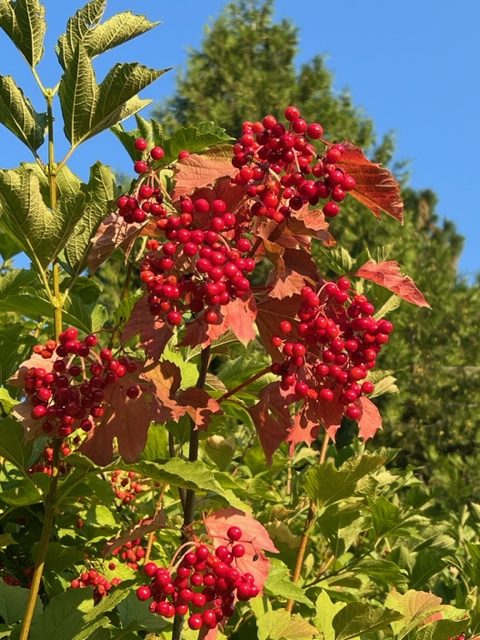
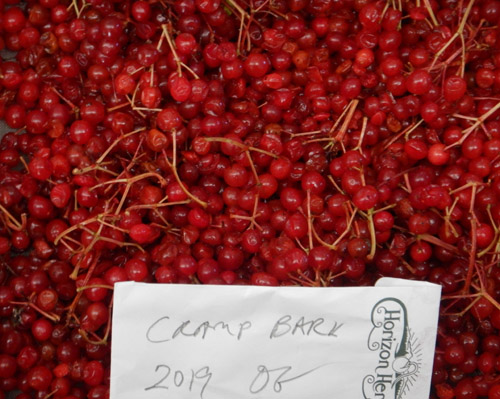
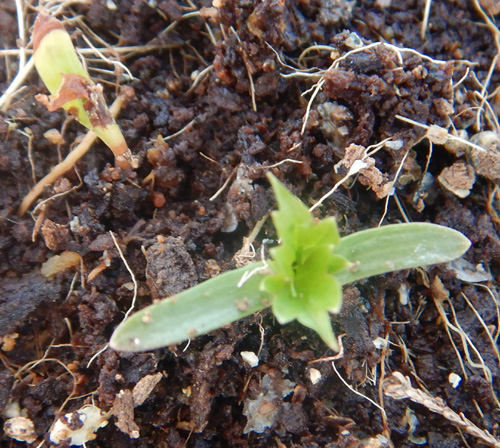
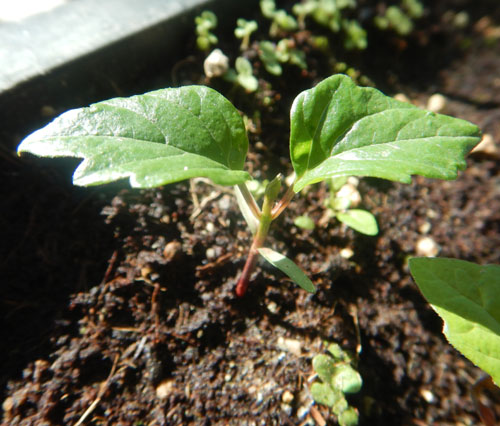
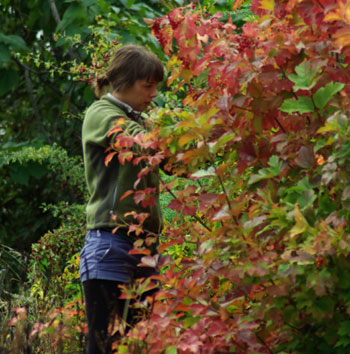
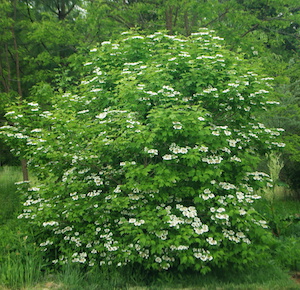
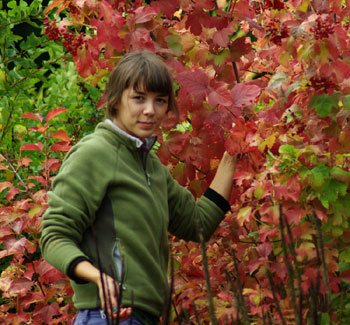
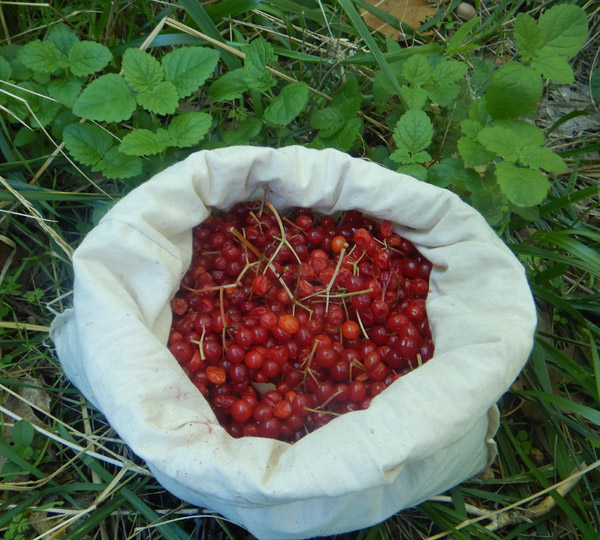


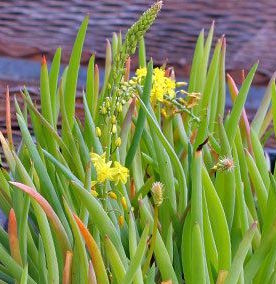
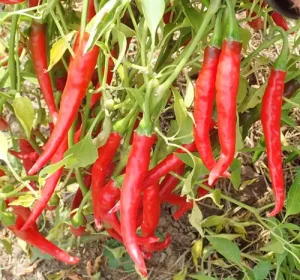
Question
Vickie –
When stripping the bark for medicinal use does it kill the tree/bush?
Upvote if this was helpful (0) Downvote if this was not helpful (0) Watch Unwatch Flag for removal
Richo Cech –
Hi Vickie, thanks for writing. No, one uses the spring prunings and takes care not to girdle the tree. richo
Upvote if this was helpful (0) Downvote if this was not helpful (0) Flag for removal
Michelle (verified owner) –
We use received our seeds.
Moist shade…can that be in our basement? Do we need a grow light in the vacinity?
Upvote if this was helpful (0) Downvote if this was not helpful (0) Flag for removal
Richo Cech –
Hi Michelle,
Thanks for contacting! Moist shade is intended to mean outdoor shade where temperatures oscillate. Cramp Bark is not light-dependent and doesn’t need a grow light. It may be helpful to read about natural growing techniques and multicycle germinators in “Growing Plant Medicine Vol 1”
All the best, Richo
Upvote if this was helpful (2) Downvote if this was not helpful (0) Flag for removal
Question
Stephanie Naftal –
Reading your description. So starting from seeds, it’s best to start them in fall?? Or could I start them now?? Also, do these like to be multiple plants, hanging out together? Thanks Richo!!
Upvote if this was helpful (0) Downvote if this was not helpful (0) Watch Unwatch Flag for removal
Richo Cech –
hi stephanie, they are multicycle germinators and can be planted anytime. Really the best way to do this is the outdoor shadehouse technique. We’ll have a new video up on the youtube channel tomorrow afternoon that has the word “shadehouse” in the title. view that, it will help immensely. richo
Upvote if this was helpful (1) Downvote if this was not helpful (0) Flag for removal
Stephanie –
Have you ever just put them in the ground and kept them mulched??? I mean, they must reseed on their own sometimes, right?
Upvote if this was helpful (0) Downvote if this was not helpful (0) Flag for removal
Richo Cech –
hi stephanie, yes, we call this the outdoor seed bed propagation technique, it works fine! r
Upvote if this was helpful (0) Downvote if this was not helpful (0) Flag for removal
Stephanie –
Ok great!! I don’t think I have the patience/consistency for a 20 month pot method!! So just barely cover, keep moist, and mulch??
Upvote if this was helpful (0) Downvote if this was not helpful (0) Flag for removal
Richo Cech –
yes, and the germination times are the same in a nursery bed and a pot
Upvote if this was helpful (0) Downvote if this was not helpful (0) Flag for removal
Question
Kristen Smith –
Hi Richo! Do you ever offer plants of this Viburnum? Thank you!
Upvote if this was helpful (0) Downvote if this was not helpful (0) Watch Unwatch Flag for removal
Richo Cech –
Hi Kristen,
Yes, we have a population of these, I’ll set them up for sale, you inspire me, check back in a few minutes. richo
Upvote if this was helpful (2) Downvote if this was not helpful (0) Flag for removal
kris10.ann.smith –
Woo hoo!!! 🥳 Thanks so much!
Upvote if this was helpful (0) Downvote if this was not helpful (0) Flag for removal
Question
Sue Peterson –
I’m looking for Viburnum opulus var. americanum L. Ait (formerly known as Viburnum trilobum), in other words, the American form of the Highbush Cranberry. Is this it,or is this the European form?
Upvote if this was helpful (0) Downvote if this was not helpful (0) Watch Unwatch Flag for removal
Richo Cech –
Hi Sue,
Well, the subspecies or varietals of Viburnum opulus are actually a bit mixed up. What you would be getting from us is exactly what you see in the photos. Some people might call this the “trilobum” form. In any case, it’s the medicine.
Richo
Upvote if this was helpful (0) Downvote if this was not helpful (0) Flag for removal